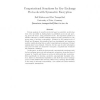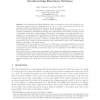42 search results - page 5 / 9 » Group Encryption: Non-interactive Realization in the Standar... |
CCS
2009
ACM
14 years 2 months ago
2009
ACM
Formal analysis of security protocols based on symbolic models has been very successful in finding flaws in published protocols and proving protocols secure, using automated too...
CSE
2009
IEEE
14 years 2 months ago
2009
IEEE
—Group-Centric Secure Information Sharing (g-SIS) is motivated by the need to dynamically share information amongst a set of authorized users for a specific purpose. Authorized ...
IACR
2011
12 years 7 months ago
2011
Zero knowledge sets (ZKS) [18] allow a party to commit to a secret set S and then to, non interactively, produce proofs for statements such as x ∈ S or x /∈ S. As recognized in...
PKC
2007
Springer
14 years 1 months ago
2007
Springer
We present the first identity-based traitor tracing scheme. The scheme is shown to be secure in the standard model, assuming the bilinear decision Diffie-Hellman (DBDH) is hard in...
ASIACRYPT
2006
Springer
13 years 11 months ago
2006
Springer
Non-interactive zero-knowledge proofs play an essential role in many cryptographic protocols. We suggest several NIZK proof systems based on prime order groups with a bilinear map...


